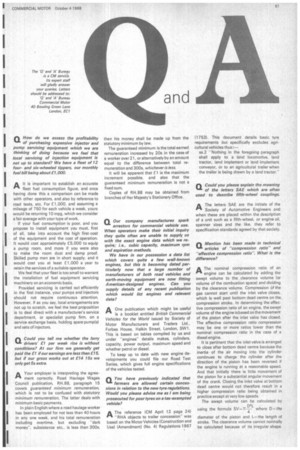Q How do we assess the profitability
Page 63

If you've noticed an error in this article please click here to report it so we can fix it.
of purchasing expensive injector and pump servicing equipment which we are thinking of doing because we feel that local servicing of injection equipment is not up to standard? We have a fleet of 12 fourand six-wheeled tippers, our monthly fuel bill being about .£1 , 000.
A It is important to establish an accurate
• —• fleet fuel consumption figure. and once having done this a comparison can be made with other operators, and also by reference to road tests, etc. For £1,000, and assuming a mileage of 750 for each vehicle a week, yours would be returning 10 mpg, which we consider a fair average with your type of work.
If your fuel consumption is poor, and you propose to install equipment you must, first of all, take into account the high first-cost of the equipment and the cost of operation. It would cost approximately £5,000 to equip a pump room, and more if you were also to make the room dust and damp proof. Skilled pump men are in short supply, and it would cost you at least £1.000 a year to retain the services of a suitable operator.
We feel that your fleet is too small to warrant the installation of fuel equipment servicing machinery on an economic basis.
Provided servicing is carried out efficiently in the first instance, your pumps and injectors should not require continuous attention. However, if as you say, local arrangements are not up to scratch, we feel the best proposition is to deal direct with a manufacturer's service department, or specialist pump firm, on a service exchange basis, holding spare pump(s) and sets of injectors.












































































































